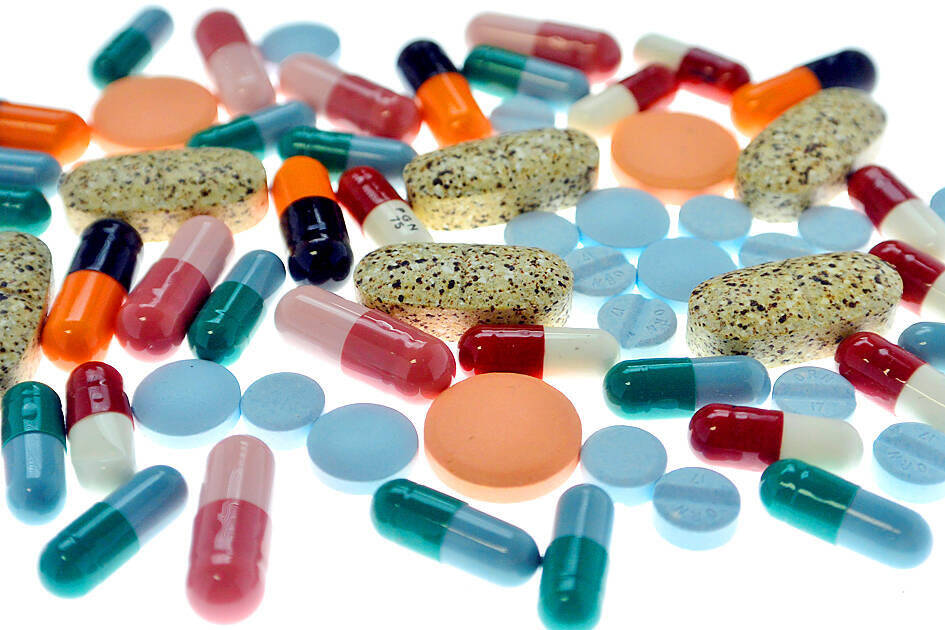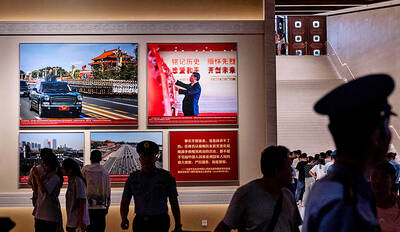Taiwan should improve its capabilities to manufacture generic drugs, which would reduce the effects of possible price increases due to US tariff policies, Taiwan National University Hospital president Yu Chung-jen (余忠仁) said this week.
Yu made the remark after US President Donald Trump said he intended to implement a 150 percent tariff on imported drugs, with a possible increase to 250 percent.
Pharmaceutical companies typically have uniform prices globally — with market-based demand and local regulations having an effect — but the tariff threat has prompted them to mull region-based pricing, Yu said.

Photo: Reuters
Taiwanese would benefit if pharmaceutical companies drop prices outside the US, but they might increase them, he said.
Regardless, the National Health Insurance would face added pressure if prices rise and people in Taiwan would face the same issue for branded drugs, he said.
To reduce reliance on brand-name drugs, Taiwan should step up efforts to enhance generic drug manufacturing capabilities, he said, adding that ingredient sourcing is a major factor in that goal, as without them, production lines would grind to a halt.
Moreover, the US’ motives for pharmaceutical tariffs are defensive, and would affect generic and branded drugs exported by Taiwan, Yu said.
However, Southeast Asia and South America are the top markets for Taiwan’s drug exports, and they rarely enter the US, he added.
On Thursday, Minister of Health and Welfare Chiu Tai-yuan (邱泰源) said that the ministry has launched four measures to ensure stable drug provision and prices.
A platform to monitor drug shortages would be established, while the risk of shortages of essential drugs should be monitored and backups prepared, Chiu said.
The ministry is looking to increase its reserve of drugs and drug-manufacturing ingredients, he said.
The National Health Insurance Administration (NHIA) and the Food and Drug Administration would work together to ensure that prices for essential drugs would not be lowered to keep manufacturers interested in the Taiwan market, he added.
The ministry would provide incentives, including a three-year price freeze to encourage local production of generic and biosimilar drugs, he said.
The ministry has allocated NT$20 billion (US$666.44 million) to offset the effects of US tariffs, Chiu said.
NHIA Director-General Shih Chung-liang (石崇良) said that his agency has introduced multiple measures to encourage drug manufacturing, citing an initiative launched last year to promote production of biosimilars, aiming to have a market distribution of 70 percent generic drugs and 30 percent biosimilars within three years.

Three batches of banana sauce imported from the Philippines were intercepted at the border after they were found to contain the banned industrial dye Orange G, the Food and Drug Administration (FDA) said yesterday. From today through Sept. 2 next year, all seasoning sauces from the Philippines are to be subject to the FDA’s strictest border inspection, meaning 100 percent testing for illegal dyes before entry is allowed, it said in a statement. Orange G is an industrial coloring agent that is not permitted for food use in Taiwan or internationally, said Cheng Wei-chih (鄭維智), head of the FDA’s Northern Center for

The Chinese military has built landing bridge ships designed to expand its amphibious options for a potential assault on Taiwan, but their combat effectiveness is limited due to their high vulnerability, a defense expert said in an analysis published on Monday. Shen Ming-shih (沈明室), a research fellow at the Institute for National Defense and Security Research, said that the deployment of such vessels as part of the Chinese People’s Liberation Army (PLA) Navy’s East Sea Fleet signals a strong focus on Taiwan. However, the ships are highly vulnerable to precision strikes, which means they could be destroyed before they achieve their intended

About 4.2 million tourist arrivals were recorded in the first half of this year, a 10 percent increase from the same period last year, the Tourism Administration said yesterday. The growth continues to be consistent, with the fourth quarter of this year expected to be the peak in Taiwan, the agency said, adding that it plans to promote Taiwan overseas via partnerships and major events. From January to June, 9.14 million international departures were recorded from Taiwan, an 11 percent increase from the same period last year, with 3.3 million headed for Japan, 1.52 million for China and 832,962 to South Korea,

REWRITING HISTORY: China has been advocating a ‘correct’ interpretation of the victory over Japan that brings the CCP’s contributions to the forefront, an expert said An elderly Chinese war veteran’s shin still bears the mark of a bullet wound he sustained when fighting the Japanese as a teenager, a year before the end of World War II. Eighty years on, Li Jinshui’s scar remains as testimony to the bravery of Chinese troops in a conflict that killed millions of their people. However, the story behind China’s overthrow of the brutal Japanese occupation is deeply contested. Historians broadly agree that credit for victory lies primarily with the Chinese Nationalist Party (KMT)-led Republic of China (ROC) Army. Its leader, Chiang Kai-shek (蔣介石), fled to Taiwan in 1949 after losing a